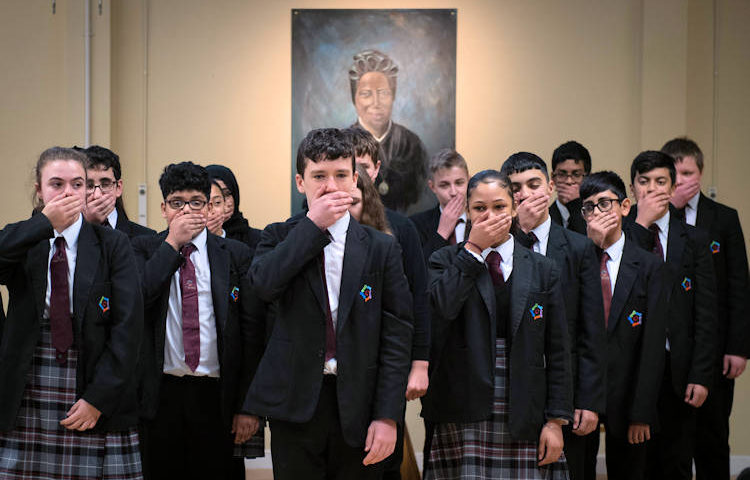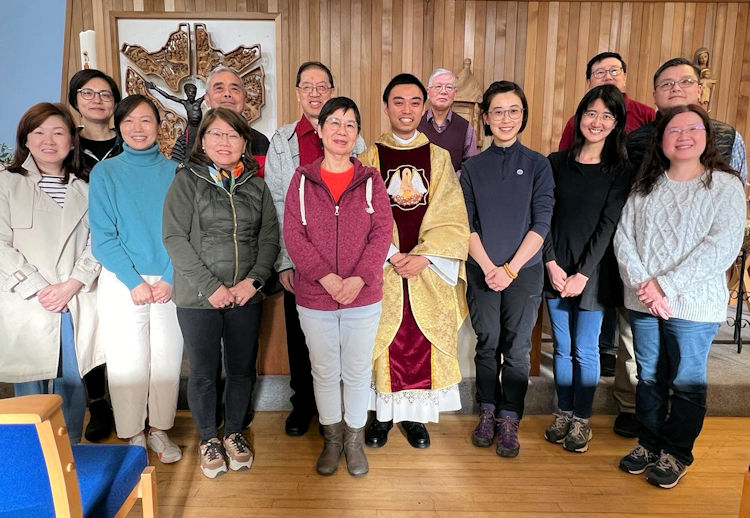Peterborough students hear of modern slavery issues

North Walsham churches sign up to unity covenant
February 2, 2019
Cathedral in Norwich bids a fond farewell to Fr Seelan
February 12, 2019Students from St John Fisher High School in Peterborough have learnt about the massive problem of modern-day slavery from a high-powered panel of professionals including two bishops, officers of the Santa Marta Group, Cambridgeshire Police and the Gangmasters and Labour Abuse Authority. Keith Morris reports.
Around 200 students took part in the day-long event on Friday (February 8) which marked the Feast of St Josephine Bakhita, the patron saint linked with human trafficking and modern slavery, having been trafficked herself in the 19th Century.
They heard heart-breaking stories about people who have experienced exploitation, the huge extent of the issue both world-wide and in areas like East Anglia, and what the range of organisations represented are doing to help tackle the problem.
Bishop Patrick Lynch – Lead Bishop on Human Trafficking & Modern Day Slavery for the CBCEW, told students of his own brief experience of the back-breaking work of picking potatoes out in the fields. Also about his time as a priest in Peterborough when he regularly said Mass in a sugar-beet factory for Irish fishermen who came to the town for work to provide for their families during the winter months when they could not fish.
“One of the sad features of our world today is that slavery still exists all over the world including our own country, especially in the agricultural sector in places such as East Anglia,” he said. “So today, on the Feast of St Josephine Bakhita who herself was exploited as a slave, we pray that as individuals, as a Church and as a country we may have the wisdom to see that exploitation, the courage to speak about it and the determination to eliminate it.”
 Bishop Alan Hopes (pictured right) told students: “Slavery is not something from the past – it is happening today, just in different ways. The church is involved because we believe in the dignity and sanctity of every human life and the personal freedom given to them by God himself.”
Bishop Alan Hopes (pictured right) told students: “Slavery is not something from the past – it is happening today, just in different ways. The church is involved because we believe in the dignity and sanctity of every human life and the personal freedom given to them by God himself.”
Phoebe Prendergast and Cecilia Taylor-Camara, from the Santa Marta Group, spoke about how vulnerable people can become victims of slavery while Deputy Director, Michael Duthie, a former senior Met Police officer, explained how the Group had been formed after concerns surrounding exploitation leading up to 2012 Olympics in London and now aimed to help the Catholic Church work closely with local Police forces to help stop exploitation through prevention work, safe houses and campaigning.
Lysbeth Ford, Partnership Development Manager from the Gangmasters and Labour Abuse Authority (GLAA), gave an informative talk to students about the organisation’s important work in preventing worker exploitation and its powers to investigate the organised criminals behind such activities as car washes, nail bars, massage parlours, construction work, agriculture, cleaning, hospitality and care home work.
“Labour exploitation is all about the money that can be made with organised crime behind it,” said Lysbeth. “It you are forced, coerced or deceived into work then you are being exploited.”
PC Kevin Murphy of the Cambridgeshire Police’s Youth Offending Services spoke about Gangs and Knife Crime which, he said, are very prevalent in and around Peterborough. Gangs forced out of big cities by Police attention move into towns such as Peterborough and are often referred to as County Lines.
They recruit young people who appear to be at a loose end out on the streets. Better school attendance and providing sport or other activities can prevent this happening.
Knife-related crime in Britain today is at its highest level since the second world war said PC Murphy, who stressed to students the dangers of carry a knife or similar sharp object which is now a criminal offence and attracts a prison sentence. “They can also be used against you,” he warned.
Sixth Formers and year 10 and 11 students attended workshops during the day and a special liturgy service which included drama, singing, prayers and readings by students.
See a full picture gallery here.
Reaction
St John Fisher Headteacher, Sean Hayes, said: “We were delighted to be asked to host this year’s event and sought to include as many students as possible. The Sixth Form experienced a carousel of workshops on different aspects of the issues of human trafficking and modern slavery, while Years 10 and 11 had an assembly and a series of talks respectively. Students in Years 7-9 explored the topic in lessons in the previous weeks and produced a display of chain links that each recorded an aspect of the issue.
“The students found the content eye-opening and informative. Many said that they had not appreciated the issues were so real and close. It was certainly a very educational day.”
“It made me think about previous things I had noticed at a car wash. I had seen the signs but not realised what they meant; I do now.”
Princess, Year 12 (aged 16)
“It made me more aware of the organisations that can help young people deal with issues such as gang crime and knife violence. I now understand more that victims are exploited and targeted for a reason.”
Lerica, Year 12 (aged 16)
“I now know that these issues are all around us but we don’t see them. We see them in the movies but don’t think of that as reality.”
Asiyah, Year 13 (aged 18)
“It was scary to learn that gangmasters could be in Peterborough recruiting children.”
Joao, Year 13 (aged 17)
Pictures by Mazur/catholicnews.org.uk




